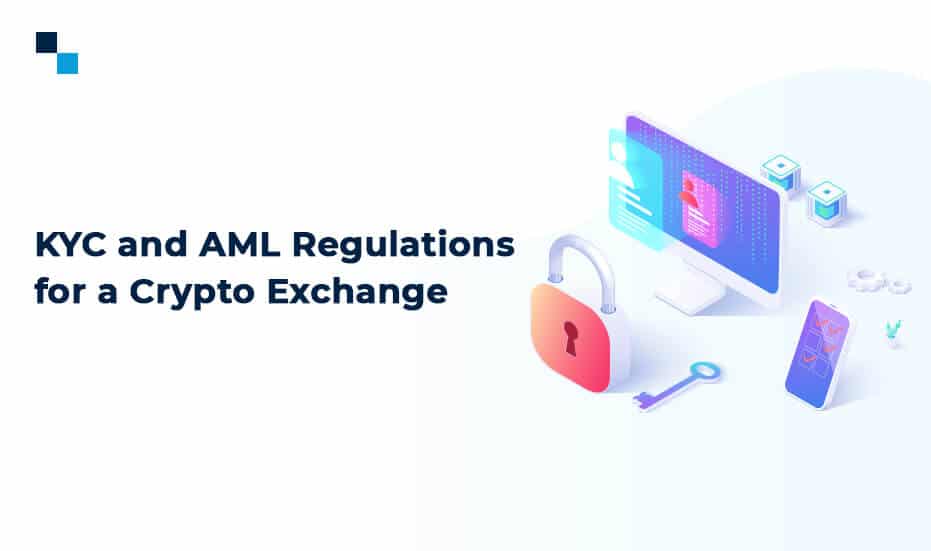
New-Gen Crypto-Friendly Bank Development Solutions for New Digital World
April 30, 2021
DeFi Wallet Vs Custodian Exchange Wallet – The Better Pick to Store Digital Assets
May 4, 2021After the advent of blockchain and cryptocurrencies, the face of the finance industry is undergoing a huge change. While this comes with its bag of benefits, there are some challenges that cannot be ignored. One of the very important challenges is money laundering using anonymous accounts on cryptocurrency exchanges. Using a cryptocurrency exchange script, an exchange can easily stay on the right side of the law and prevent unlawful management of funds.
Recently, a study revealed that almost 69% of 216 exchanges do not adhere to a complete KYC procedure. CipherTrace’s report claims that one-third of the top ranking 120 crypto exchanges have a weak KYC process in place.
While the concept of Know Your Customer (KYC) and Anti-money Laundering conflict with the decentralized nature of blockchain, they have become a necessity for crypto exchanges. These regulations primarily prevent monetary frauds and mismanagement of funds.
According to Europe’s AMLD5 (Fifth anti-money laundering directive) and USA’s FinCEN’s Final Rule, all cryptocurrency exchanges must comply with anti-money laundering regulation. Thus, many cryptocurrency exchange script developers have started to program KYC and AML procedures in the script itself.
Finalize your KYC and AML procedures
Know-Your-Customer or KYC is an effective implementation of AML policy. Here is how exchanges finalize their procedures.
• Crypto-to-Crypto Exchanges
If you own an exchange that is registered in the European Union and supports only crypto-to-crypto trades, you might not be required to follow an AML procedure. That’s because the AML legislation for crypto-to-crypto exchanges is not established in the EU. On the other hand, if your exchange is listed in the USA, you will have to implement the KYC procedure.
This is why the majority of crypto-only exchanges block US citizens from accessing their services. It means that these exchanges would have to implement KYC. A traditional KYC verification process has data security issues and is not scalable. That is why it is important for the Bitcoin exchange script to support the KYC process too.
There are some crypto exchanges like HitBTC and Huobi Global that have a very light KYC process in place. These allow traders to deposit and trade crypto without any type of KYC, but at the time of withdrawal or while withdrawing higher amounts, the users need to go through a KYC process. This delays the withdrawal process as traders need to wait for 2-3 days for the KYC process to complete. Thus, it is better to have a KYC process established at the time of sign-ups and deposits.
• Fiat-to-Crypto Exchanges
For the Fiat to crypto exchanges, there is a more effective KYC regulation in place in both the USA and the EU. Some of the very popular exchanges like Gemini are completely compliant with the regulation and have a full KYC process in place while withdrawing funds.
Here are some of the ways to establish KYC:
• Full KYC
The crypto exchange script can be written in a way that at the time of registration, the user is required to provide only the following details – full name, address, active phone number, email id, date of birth, and social security number at times. However, at the time of withdrawal, the user is required to verify his identity by submitting government-approved official documents like a passport.
• No KYC with withdrawal limits
Many top-ranking exchanges like Binance use this methodology. For example, Binance allows users to withdraw up to 2 BTC per day.
However, if they suspect a user, they can always ask the user to provide KYC information. Also, the exchange might have to change the KYC process based on the jurisdiction they are operating from. For example, Binance US users need to complete their KYC process in a stricter fashion.
Both Crypto-to-crypto and fiat-to-crypto exchanges
Crypto exchanges that support both crypto-to-crypto and fiat-to-crypto transactions can alter their KYC processes for both categories of traders. For example, for crypto-to-crypto traders, the exchanges can be a little easy with the KYC based on the jurisdiction of operations. However, for the fiat-to-crypto traders, they can support deposit and trade with light KYC and ask for complete KYC at the time of fund withdrawals.
To wrap
All in all, there is no way of escaping AML compliance. This means it has become a must for the exchanges to use effective KYC procedures. The KYC helps exchange from becoming a part of the money laundering process.
At Antier Solutions, we provide crypto exchange platforms fortified with the right KYC process. Whether you need a cryptocurrency exchange script or a custom exchange built from scratch, we provide KYC-compliant exchange platforms reinforced with institutional-grade security and market-leading features that contribute to the high performance of the exchange.
Schedule a free demo of our white label exchange platform or connect with our subject matter experts to share your needs for a custom crypto exchange.



